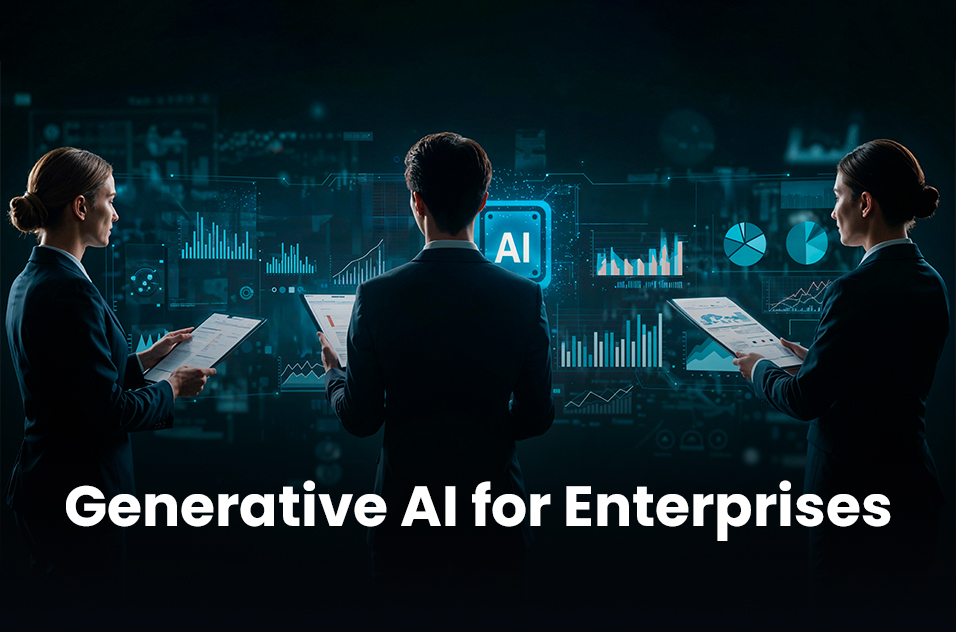
In a landscape marked by digital acceleration, Generative AI for enterprises has emerged as more than just a tech buzzword – it’s a strategic advantage. From enhancing decision-making to streamlining complex operations, generative AI is transforming enterprise workflows across industries and geographies.
Whether you’re operating in tech-forward markets like the United States, innovation-driven economies such as the UAE and Qatar, or digitally evolving nations like Spain, leveraging generative AI can significantly elevate your enterprise’s operational efficiency, productivity, and competitiveness.
Generative AI refers to algorithms – often based on deep learning and large language models (LLMs) – that can autonomously create new content such as text, images, code, audio, and even synthetic data. For enterprises, this means automation of traditionally manual processes, advanced data interpretation, and scalable creativity that adapts to real-time business needs.
The key distinction of generative AI lies in its ability to not just analyze data, but to generate outputs based on learned patterns – reshaping how organizations approach tasks, from content creation and customer service to coding and design.
Enterprises across sectors – finance, healthcare, manufacturing, and logistics – are built on knowledge-intensive processes. Generative AI automates the repetitive, cognitive aspects of this work.
Use Cases:
The result is reduced operational costs and improved turnaround times, allowing employees to focus on higher-value activities.
Unlike traditional BI tools that present historical data, generative AI can simulate scenarios and create predictive narratives. It enables decision-makers to not only understand what has happened, but also explore what could happen – and why.
Example Applications:
By automating insight generation, enterprises improve agility and reduce the reliance on large analytics teams.
Today’s enterprises compete on customer experience. Generative AI allows for hyper-personalized, always-on engagement through conversational AI, content generation, and dynamic service delivery.
Key Impact Areas:
The ability to deliver a unified, personalized experience at scale is a major differentiator for global enterprises.
For IT-heavy enterprises, generative AI drastically reduces the time to develop, test, and deploy software. Tools like GitHub Copilot and OpenAI Codex already assist developers in writing and debugging code.
DevOps Benefits:
In regions with booming tech hubs like the US and UAE, enterprises adopting generative AI in DevOps are achieving faster time-to-market and higher code quality.
Marketing teams are leveraging generative AI to ideate, create, and scale campaigns with reduced dependency on traditional creative cycles.
Marketing Use Cases:
This blend of creativity and efficiency is critical for B2B enterprises targeting multiple regions and channels.
Enterprises are awash with data, but unlocking its value is often hampered by complex integration and processing workflows. Generative AI assists in data ingestion, transformation, and documentation.
Operational Advantages:
This enables data teams to focus on strategic insights instead of technical maintenance.
One of the most promising shifts is the rise of AI co-pilots for various roles – HR, finance, marketing, customer support, and engineering.
These AI companions assist with:
For multinational enterprises with teams across the US, Qatar, and Europe, AI co-pilots can unify internal operations while respecting regional nuances and compliance.
While the benefits are transformative, enterprises must also address:
The business case for Generative AI for enterprises is clear – it enables faster decisions, improved customer engagement, and operational excellence. For enterprises operating in the US, UAE, Qatar, Spain, and broader Middle East and European markets, adopting generative AI is not just about innovation – it’s about future readiness.
Those who integrate generative AI strategically today will lead their industries tomorrow.
Generative AI is redefining how enterprises function, innovate, and scale. Whether you’re a global corporation headquartered in the United States, a government-backed entity in the UAE, a fast-growing startup in Qatar, or a multinational firm in Spain, embracing this technology today sets the foundation for smarter, leaner, and more agile business operations.
Generative AI for enterprises is more than a trend – it’s a transformation engine. The question is not if but how fast you can adopt it to stay ahead
Generative AI refers to advanced algorithms that can create text, images, code, and other forms of content based on training data. In enterprise workflows, it is used to automate repetitive tasks, enhance decision-making, and streamline processes across departments such as HR, marketing, customer support, and IT operations.
Generative AI helps enterprises reduce operational costs, improve team productivity, accelerate time-to-market, and deliver personalized customer experiences. It enables scalable automation and insight generation, making businesses more agile and future-ready.
Departments such as marketing, customer support, HR, finance, legal, and IT benefit significantly from Generative AI. It assists in content creation, intelligent chat support, automated document drafting, code generation, and real-time data analysis.
Yes, Generative AI is highly adaptable and supports multilingual capabilities, making it ideal for global enterprises. It helps maintain consistency in service delivery, compliance, and localization, especially for companies operating in diverse markets.
Enterprises can start by identifying high-impact use cases like report automation, chatbot deployment, or code generation. Partnering with a technology provider like Zoondia can help design and implement tailored Generative AI solutions aligned with specific business goals.
By continuing to use the website, you agree to our Cookie Policy. To learn more about how we process your personal data, read our Privacy Policy
